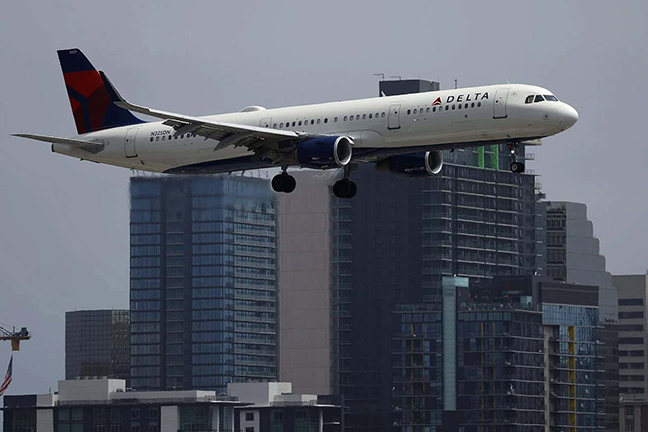Delta further suspends Israel flights through March

A Delta Airlines Airbus A321-211 aircraft approaches San Diego International Airport for a landing from Atlanta on June 28, 2024 in San Diego. Photo by Kevin Carter/Getty Images.
Delta Airlines announced the suspension of flights between Tel Aviv and New York City through March 31, 2025, “due to ongoing conflict in the region.”
The Atlanta-based carrier stated on Oct. 15 that a travel waiver has been issued for all customers who bought tickets for the Ben-Gurion International Airport-John F. Kennedy International Airport route on the affected dates.
“Customers impacted by the schedule change will receive notifications via the Fly Delta app and contact information listed in their reservation as these cancellations are processed in Delta’s system,” the airline wrote.
The nonstop Delta flights from Atlanta to Israel, which were inaugurated in 2023, just months before the Hamas invasion of Oct. 7, have been suspended ever since and there has been no announcement of their resumption.
The New York flights, which had been suspended after Oct. 7, resumed in June.
Wizz Air, one of the leading low-cost carriers to Israel, announced the cancellation of flights to and from the country until Jan. 14, 2025.
The decision, affecting all routes and destinations, marks one of the longest suspension periods announced by the airline in response to the ongoing wars against Hamas in Gaza and Hezbollah in Lebanon.
The move by Wizz Air, which previously operated around 200 flights per week from Israel to over 20 destinations, is expected to impact more than 100,000 Israeli passengers who had already purchased tickets. Industry experts predict that the three-month hiatus will likely lead to a sharp increase in ticket prices for all European destinations.
Despite the European Union Aviation Safety Agency lifting its recommendation against flying to Israel, many airlines continue to exercise caution. The Israel Airports Authority has announced that starting Oct. 16, all international flights will operate solely from Terminal 3 at Ben-Gurion International Airport due to the reduced number of airlines currently serving Israel.
Other major carriers have also adjusted their schedules:
- Aegean Airlines has postponed its return to Israel until Nov. 5.
- Air France and Transavia have delayed resuming flights until Oct. 22.
- LOT Polish Airlines has pushed back its return to Nov. 1.
- Lufthansa Group, including SWISS, Austrian Airlines and Brussels Airlines, has extended its suspension of flights to Ben-Gurion International Airport until mid-October.
An Air France passenger plane was nearly hit by a ballistic missile during Iran’s attack on Israel on Oct. 1. The flight, according to a report by the German news outlet Bild, departed Paris en route to Dubai. As it passed through southwestern Iraqi airspace, the pilots noticed missiles near their aircraft.
Passengers have been advised by airlines to stay informed about their flight statuses and potential schedule changes.
In August, Congress questioned the long suspension of flights to Israel. Rep. Ritchie Torres, a New York Democrat, asked the CEOs of American, Delta and United Airlines about it, saying they were “effectively boycotting” Israel while other carriers, including from the Gulf countries, had no issues flying to Israel and elsewhere to the region.
Rep. Marc Molinaro, a New York Republican, asked the Federal Aviation Administration what it is telling the airlines regarding flights to Israel, but the agency delayed responding to his request.
Eyal Hulata, who served as national security adviser to two Israeli prime ministers, Naftali Bennett and Yair Lapid, told The Free Press that the American carriers “are playing into Iran’s game” of trying to isolate Israel.
The Free Press also reported that the president of the Allied Pilots Association ordered the union’s members to refuse requests from American Airlines to fly to Tel Aviv. The union noted increased insurance costs and the safety of pilots and crew who to spend the night in Israel after each flight.
In February, the Association of Flight Attendants-CWA and six other unions called for a U.S. ban on military supplies to Israel, and the union’s spokeswoman routinely posts anti-Israel pieces on social media.
El Al has continued service throughout the conflict.
(JNS and staff reports)



